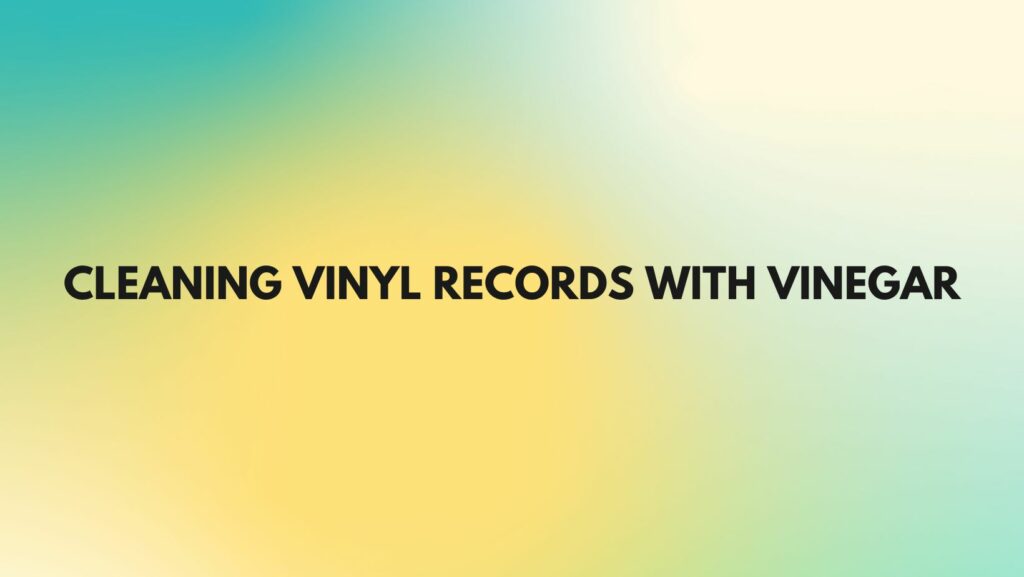Vinyl records, with their timeless charm, invite us into a world of warm, analog sound. However, the occasional pops and crackles can disrupt this auditory bliss, signaling the need for a thorough cleaning. In the quest for effective and budget-friendly solutions, some vinyl enthusiasts turn to vinegar as a cleaning agent. In this guide, we’ll delve into the method of cleaning vinyl records with vinegar, exploring its benefits, considerations, and potential drawbacks.
- Understanding the Vinegar Solution:
Vinegar, a pantry staple known for its versatility, is occasionally used by vinyl aficionados for cleaning records. Its acidic nature is believed to cut through grime and contaminants on the record surface, offering a cost-effective alternative to commercial cleaning solutions.
- DIY Vinegar Cleaning Solution:
To create a vinegar cleaning solution, mix equal parts distilled water and white vinegar. This DIY concoction is believed to be gentle enough not to harm vinyl records while still possessing the cleaning power to lift dirt and residues.
- Application Method:
Apply the vinegar solution to a clean, soft cloth or a dedicated vinyl brush. Gently wipe the record surface in the direction of the grooves, ensuring even coverage. Use a circular motion to target stubborn spots, applying minimal pressure to prevent potential damage.
- Rinse with Distilled Water:
Following the vinegar cleaning, it is advisable to rinse the record with distilled water. Dampen a clean cloth or use a separate cloth to wipe away any remaining vinegar residue. This step helps ensure that no acidic traces are left on the vinyl.
- Drying Process:
Allow the record to air-dry completely before playing. Ensure that there is no residual moisture, as playing a wet record can damage the stylus and affect playback quality. Patience in the drying process is key to preventing any adverse effects on the vinyl.
- Potential Benefits of Vinegar Cleaning:
- Affordability: White vinegar is a cost-effective option compared to some commercial record cleaning solutions.
- Accessibility: Most households have vinegar readily available in the kitchen, making it a convenient choice for impromptu cleaning sessions.
- Considerations and Drawbacks:
- Residue Concerns: While rinsing with distilled water helps mitigate residue concerns, there is still a risk of vinegar leaving behind a faint odor or affecting the record surface.
- Caution with Colored Vinyl: Exercise caution when cleaning colored vinyl records, as vinegar’s acidic nature may interact differently with the dyes, potentially causing damage or discoloration.
- Record Label Sensitivity: Some vintage records have paper labels that can be sensitive to moisture. Avoid saturating the label area to prevent damage.
- Alternative Cleaning Methods:
- Commercial Cleaning Solutions: Purpose-built vinyl record cleaning solutions are formulated to be gentle on records while effectively removing contaminants.
- Record Cleaning Machines: Automated machines use a combination of brushes and cleaning solutions to deep-clean records thoroughly.
- Isopropyl Alcohol: A mixture of high-purity isopropyl alcohol and distilled water is a common DIY solution that some enthusiasts prefer for cleaning records.
- Regular Maintenance Routine:
Regardless of the cleaning method chosen, incorporating regular record maintenance into your routine ensures the longevity and optimal performance of your vinyl collection.
Conclusion:
Cleaning vinyl records with vinegar is a cost-effective and accessible method that has garnered attention within the vinyl community. While it may offer satisfactory results, it’s essential to weigh the potential drawbacks and exercise caution, particularly with colored vinyl and vintage records with sensitive labels. Alternatives such as purpose-built solutions and record cleaning machines may provide a gentler and more controlled approach to preserving the authenticity of your vinyl listening experience. As with any cleaning method, a consistent and careful routine ensures that your vinyl records stand the test of time, allowing the analog charm to continue resonating with each spin.


